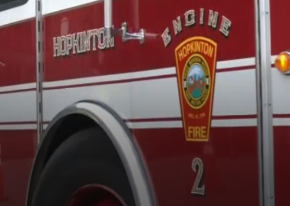
Fire Chief Gary Daugherty and Town Manager Elaine Lazarus report that the Hopkinton Fire Department is banning all outdoor burning until further notice, per guidance issued by the State Fire Marshal, and asks all residents and businesses continue to refrain from unnecessary water use to conserve available resources.
As dry conditions and drought continue, fire risks remain exceptionally high. The outdoor fire ban is authorized under Section 10.10.2 of the Massachusetts Comprehensive Fire Safety Code, which includes all open, recreational, and cooking fires or other sources of ignition outdoors, such as fires associated with fire pits, chimineas, outdoor fireplaces, and cooking and heating equipment that are not specifically covered under the Open Burning regulation.
As a reminder, open burning is prohibited this time of year. Open burning season is from Jan. 15 through May 1.
The extreme drought has heightened fire hazards, making open flames or ignition sources especially risky. Ongoing red-flag warnings and strong wind gusts are accelerating the spread of fires. These statewide weather conditions place all Massachusetts communities at an elevated risk for brush fires.
In Massachusetts, an average of 15 wildland fires are reported each October, according to the Massachusetts Department of Fire Services (DFS). This year, the month’s total capped at about 200 – an increase of about 1,200 percent over the average. Of these fires, 100 were reported over the last seven days, and preliminary information indicates that all of them started with human activity.
This ban will remain in effect until the area receives substantial rainfall to reduce fire risks.
The Hopkinton Fire Department would like to share the following safety tips from the Massachusetts DFS with residents and community members as fire conditions across the state should be monitored closely:
Refrain from outdoor cooking and heating. Sparks and embers from chimneys, fire pits, and grills can easily ignite dry vegetation, debris, and overhanging branches.
Do not use gasoline or other flammable or combustible liquids to burn brush, trash, or other waste.
Extinguish smoking materials in a sturdy ashtray with water or sand. Never toss cigarette butts, matches, or other smoking materials over the edge of a balcony, stub them out on stairs or railings, or toss them in dry vegetation or debris.
Use caution with lawnmowers, leaf blowers, all-terrain vehicles, and other power equipment. The engines can become hot enough to ignite dry leaves and grass.
Properly dispose of ashes or coals from fireplaces, wood stoves, or grills in a metal can, douse it with water, and secure it with a tight-fitting lid. These ashes can remain hot enough to reignite and cause a fire.
Residents and community members should follow instructions from local safety officials.
At this time, residents and businesses must also refrain from excessive water use. Water for non-essential uses, including watering lawns, washing vehicles except in a commercial car wash or as necessary for operator safety, or washing exterior building surfaces, parking lots, driveways, or sidewalks, is prohibited.
The Town, through its Director of Public Works, has declared a Mandatory State of Water Supply Conservation, as of September 17th, 2024, for all customers connected to the municipal water system. This Mandatory Action is authorized by the Town Bylaws, Chapter 199, Article II, Section 199-6: Restricted Water Uses.
Residents on the municipal water system must turn off lawn sprinklers to help preserve water supplies for essential daily needs and fire protection.
The following penalties apply to violations of this Mandatory State of Water Supply
Conservation:
First offense – Written warning
Second offense - $100 Fine
Third offense and beyond – Water service may be suspended as groundwater levels are declining because of the drought, pumping capacity is decreasing at well sources. Due to dry conditions and high temperatures, systems are expected to be under strain throughout the end of the month.
Low groundwater levels are also causing water to be pulled from further out in aquifers, negatively affecting water quality and causing periodic discoloration.
Residents may notice a slight discoloration in their water. However, the water remains safe to drink and use.
The Town of Hopkinton also shares the following tips from the Massachusetts Water Resources Commission on ways to conserve water:
Limit lawn watering, especially during a drought. Lawns naturally go dormant during dry conditions. They will revive when conditions improve.
Choose native plants or plants and turf that need less water.
Use mulch to reduce evaporation and moderate soil temperature.
Leave grass clippings on lawns to shade and return nutrients to the soil.
Sweep driveways, walkways, patios, and other outdoor areas with a broom rather than hosing them off.
Wash vehicles using a bucket and sponge, employing a hose with a shut-off nozzle for rinsing only, or, if available, use a commercial car wash that recycles water (most do).
Turn off the water while brushing teeth or shaving (“Never let the water run.”)
Take shorter showers and use water-saving showerheads.
Wash only full loads of laundry and dishes.
Fix leaky faucets, toilets, and pipes as soon as you notice them.















